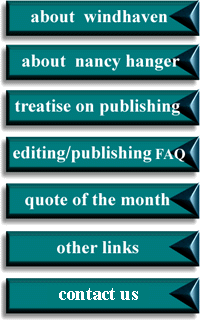
Why Copy Editors Are Necessary: A Small Treatise on the Publishing World
I'd like to take a moment to explain just what copy editors in the fiction field do, with the perspective of almost 20 years in the field, having been a developmental editor, acquiring editor, copy editor, and managing (production) editor over time.

Copy editors are often the most misunderstood variety of editor in publishing, particularly book publishing (as versus magazine and newspaper). What are copy editors? For books they are usually freelancers, but are sometimes inhouse assistants who take on copyediting tasks. Those tasks include checking the manuscript for grammar, punctuation, spelling, sense, continuity, facts, clarity, flow, and design elements. Sounds like a lot? It is. Nowadays the copy editor is often the first person to work through a manuscript in depth since the acquiring editor asked for and received the final draft of the book from the author. Too often, at least in fiction, we see now are seeing copy editors receive a manuscript that has been unread by the editor since its first draft — the copy editor is the first to really see it at all. Not to fault acquiring editors in any manner — their job is acquisition, and more and more their time is spent (and spent and spent!) working on proposals, marketing, development with the authors (sometimes, depending on the genre and house), and all the general cheerleading associated with defending and winning a space for their acquisition in the desired list of books for their imprint or house. So who is left with the actual manuscript? The copy editor.
(An even better question is, who is left to develop the manuscript to its full potential in the first place? Nowadays? ... often a freelance developmental editor.)
(NB: Copy editors in other fields, such as newspapers and magazines, traditionally work more directly with the copy that has been fully developed and checked by the editor/writer. Part of this accounts for, I believe, the dim view some people have taken of copy editors: they believe all that they do is check for grammar and impose spelling and rules upon prose ... a pleasant but somewhat anal-retentive task. Book copy editors do a far wider job in 99% of the cases, due to the reasons noted above.)
(Q: Does anal retentive have a hyphen? A: If you know the answer, then you may be a good copy editor. If you've heard this joke before, undoubtedly you are a copy editor. [For the record, the answer is: Only when used in an adjectival form.])
As a copy editor, one is expected to find all errors in grammar, punctuation, spelling, etc., keeping in mind that the author may be insulted or simply wish to keep odd spellings and grammar intact for stylistic purposes. The latter, however, often must be discovered by telepathy unless the publishing house communicates this information. Copy editing must be done with an eye toward the author's feelings, knowledge, and ego (in the good sense) at all times.
One must also find all errors of fact, no matter how obscure. In science fiction this can become even more difficult if the novel deals with near-future technology based on existing science. Like research librarians, copy editors must either know everything about everything, or be able to find information quickly and thoroughly. Both professions often refer to themselves as the secret masters of the universe (after all, they can find and manipulate information). They must also track characters, places, and all names throughout a manuscript for consistency. In addition, the plot must be tracked for consistency (similar to what a continuity editor does for films and TV): a cup picked up on page 53 should still be in the character's hand on p. 150 if he hadn't put it down anywhere in between!
(Q: How many copy editors does it take to screw in a lightbulb? A: Well, it took 27 on page 453.)
A good copy editor should be aware that language shifts and changes and allow for it to do so over time. The same goes for grammar, over time. Often, we refer to people who say that they personally "have their fingers in the dike against the downfall of the English language" as the Copy Editors from Hell. A balance needs to be observed, or one does indeed risk the author and editor's wrath, and with good reason.
Finally, one must know basic type speccing, be able to create a design sheet for the production department of the publishing house, and have a thorough knowledge of the production process and all the curious marks, glyphs, and secrets therein. Some publishing houses still teach this in-house during a training or internship period, others send their people out to colleges which teach courses in basic publishing production.
All in all, copy editors often do far more than their job calls for, and usually (in the case of freelance copy editors) for surprisingly low wages given the knowledge and skills required, and under tight time constraints.
Finally, I must point out a very important word that the reading public may not be aware of: STET. This is a Latin acronym for "let it stand," meaning "leave it as it was originally." Authors often use this to mark over copyediting done on their manuscripts, even when the correction was to a valid error (such as a factual error). I once had the horror of reading a book review reviling the copy editor at great length, pointing out all sorts of errors throughout the book. The review was less of a book review than a public execution of the (unknown) copy editor. Except the reviewer forgot the magic word STET. I was aware of who had copyedited that particular manuscript and knew that all those errors had been carefully researched and corrected or queried to the author (example: "Does author mean 'Babar the Elephant' here? Misspelled 'Barbar.') The author had stetted all the errors, and erroneous blame was put on the copy editor in a public (though anonymous) manner. It was a shame to read, knowing what I knew.
Authors and editors are not all to blame for the fate of copy editors' often infamous reputations. There are indeed copy editors who appear, from their work, to be uneducated and untrained. They are, I feel, in the minority, at least in my field of expertise. And those who do well by the authors — those who are quick and intelligent and delicately aware of an author's writing style — can reap the ultimate reward: praise.
It does happen ... occasionally. I have received a number of letters from authors who appreciated my copyediting work, some from as far away as Italy, and over the years garnered several public “thank-yous” in their books in the form of dedications or acknowledgments. To be specifically requested by a top-list author to work on his or her book is a great compliment in itself, as well. Some publishers or packagers are allowing credit for the copy editor to be placed on the copyright page alongside the editor's name — a major triumph for copy editors, who until recently have remained anonymous figures of mystery, and a step toward acknowledgment of their professionalism.
After all, they're the ones who save the reading public from such prose as the ...
